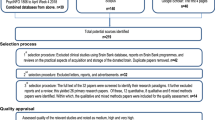Abstract
Whilst mainstream transplant literature provides valuable insights into the influences on families to donate organs and tissues for transplant, the relevance of these findings in relation to organ donation for research remain speculative. The present study aims to expand the research donation literature, by exploring factors that influence a family’s decision to donate brain tissue to neuroscience research. The verbal responses of the senior available next-of-kin (NOK), to the question of brain donation for research, are analysed. The donation rate was high (54%) over the 5-year-period. NOK relationship to the deceased, and post mortem interval were the main factors associated with a positive donation. Parents were most likely to donate and this may result from a lifetime of decision-making on behalf of the deceased. Also, the longer the interval between death of the potential donor and the question being asked, the greater the likelihood of donation.
Similar content being viewed by others
References
Azizi L, Garrick T, Harper C (2006) Brain donation for research: strong support in Australia. J Clin Neurosci 13:449–454
Beard J, Ireland L, Davis N, Barr J (2002) Tissue donation: what does it mean to families? Transplant Rev 12:42–48
Boyes M, Ward P (2003) Brain donation for schizophrenia research: gift, consent and meaning. J Med Ethics 29:165–168
Dodd-McCue D, Cowherd R, Iveson A, Myer K (2006) Family responses to donor designation in donation cases: a longitudinal study. Transplant Rev 16:150–154
Floden A, Kelvered M, Frid I, Backman L (2006) Causes why organ donation was not carried out despite the deceased being positive to donation. Transplant Proc 38:2619–2621
Garrick T, Howell S, Terwee P, Redenbach J, Blake H, Harper C (2006) Brain donation for research—who donates and why? J Clin Neurosci 13:524–528
Grinberg LT, de Lucena Ferretti RE, Farfel JM, Leite R, Pasqualucci CA, Rosemberg S, Nitrini R, Salvida PHN, Jacob Filho W (2007) Brain bank of the Brazilian aging brain study group—a milestone reached and more than 1, 600 collected brains. Cell Tissue Banking 8:151–162
Lawlor M, Dobbins T, Thomas K, Billson F (2006) Consent for corneal donation: the effect of age of the deceased, registered intent and which family member is asked about donation. Br J Ophthalmol 90:1383–1385
McDonald S, Chang S, Excell L (2008) Australia and New Zealand dialysis and transplant registry. http://www.anzdata.org.au. Accessed 15 May 2008
Millar T, Lerpiniere C, Walker R (2008) Postmortem tissue donation for research: a positive opportunity? Br J Nurs 10:644–649
Radecki CM, Jaccard J (1997) Psychological aspects of organ donation: a critical review and synthesis of individual and next-of-kin donation decisions. Health Psychol 6:183–195
Siminoff LA, Lawrence RH (2002) Knowing a patient’s preferences about organ donation: does it make a difference? J Trauma 53:754–760
Siminoff LA, Gordon N, Hewlett J, Arnold RM (2001) Factors influencing families’ consent for donation of solid organs for transplantation. JAMA 286:71–77
Stevens M (1998) Factors influencing decisions about donation of the brain for research purposes. Age Ageing 27:623–629
West R, Burr G (2002) Why families deny consent to organ donation. Australian Crit Care 15:27–32
Acknowledgments
We would like to thank the donors and their families, the Department of Forensic Medicine, the National Institute of Alcohol Abuse and Alcoholism, the Schizophrenia Research Institute (supported by infrastructure funding from New South Wales Health), the Sydney South West Area Health Service, the University of Sydney and the New South Wales Coroner’s Office.
Author information
Authors and Affiliations
Corresponding author
Rights and permissions
About this article
Cite this article
Garrick, T., Sundqvist, N., Dobbins, T. et al. Factors that influence decisions by families to donate brain tissue for medical research. Cell Tissue Bank 10, 309–315 (2009). https://doi.org/10.1007/s10561-009-9136-1
Received:
Accepted:
Published:
Issue Date:
DOI: https://doi.org/10.1007/s10561-009-9136-1




